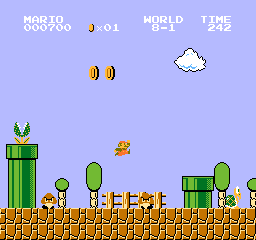What if a game failed to create any goals for the player to meet? What, then, would be the point of playing? In absolutely every game, there is some sort of goal - something one aims for and desires to achieve. After all, desire is the motivation for human behavior.
Videogame goals come in many flavors, catering to the variability of our desire. From the very beginning, there have been rewards systems in place, encouraging gamers to persist at their electronic pursuits.
A very rudimentary system involves the accumulation of points. As arbitrary as they may seem to a rationalizing mind, the value of the "point" is, in many cases, astronomical. In the early days of gaming, especially in arcades, gamers had little else to play for. Getting the most points, becoming the top scorer, and inputting one's initials, (or, "AAA" or even, "ASS" "DIK" "FUK" and the like) was the epitome of gaming achievement, and what most players strove for.

To make the points system more concrete and meaningful, the concept of money was introduced to videogames. From coin-collecting to the economic management of sports teams, money has found its way into, and solidified a position within our favorite pastime. At first, it was simply another points system with a new label, but quickly became a useful commodity with which players could gain access to more game content. New equipment, another section of the game world, character improvement, etc., are all likely candidates for the expenditure of wealth.
In-game currency comes in innumerable forms, from leaves to dollars, and now is even transferable to real-world cash. MMOs most notably display this currency-conversion trend, allowing some industrious gamers to take advantage of others' desire for virtual funds. It's a very simple 2-step process:
1) make lots of in-game money
2) sell it on ebay
This can become quite lucrative, if done right, and I've know a few gamers who have made a somewhat stable income doing it.


Normally, virtual cash flow leads to virtual character growth, and that is the ultimate incentive behind the proximate behavior. Gamers want to have the best, most powerful and truly badass characters they can. Improving one's avatar is a huge reason to spend hours upon hours engrossed in gameplay. Oftentimes, this equates to a reasonable level of tedium (i.e. leveling), but gamers stay hooked, awaiting the eventual payoff. We know Time=Money, but in videogame land, Time=Success, as well. The more time spent with a game, the more likely one is to achieve greatness within that game.
Growth and development are also applicable to the players, themselves. There are many skill-based games that require a certain training period in order to become successful. First-person shooters are probably the most popular examples of this, where time spent playing the game is in direct relationship with a gamer's ability to be successful while playing. Simply, you get better as you play.

Improving one's skills becomes fruitless if a game offers nothing more than a limited pre-defined AI to compete with. There is a ceiling, and once a game is conquered, interest wanes rapidly. In today's online world, competitive gaming is growing in leaps and bounds. More and more gamers are participating, looking for a challenge that can only be found through such a medium, in other dedicated players like themselves. For these gamers, the rush of competition, the feeling of progress, and achieving victory over their opponents is the best reward any game could offer. Many competitive gamers won't play any other type of game at all.
For the more laid-back interactive entertainment consumer, there are other sorts of rewards. These are less material, and not quite as obvious as the others. For many gamers, the audio and visual input they soak up from the game can be enough reward, in itself. In exploring a game's content, the player is presented with a variety of stimuli designed to be sensorily pleasing, and this beauty of the craft keeps them interested.
The evidence is clear when you consider the popularity of websites like Overclocked Remix, which thrives solely on gamers' love of game music. Additionally, the number of desktop wallpapers and other videogame-related imagery available on the web is simply staggering. Gamers love their games' content.

The element of discovery is a big incentive to spend time playing games. Each game is a new world to unfold, and uncovering all of its secrets can be a truly enjoyable experience. It is no wonder that so many games include tons of collectibles, side-quests and mini-games. Complete-ism runs rampant among the gaming community - we long to explore every nook and cranny of our games, and see everything it has to offer.
Finally, there is the story. We've all heard the phrase "that book was so good, I couldn't put it down." The same applies to interactive visual stories - if a game's plot is riveting, it becomes damn near impossible to stop playing. Gamers simply want to see what happens next, and thus get lost in marathon gameplay sessions, possibly foregoing food, water, and personal hygiene.
Time is a small price to pay for the reward of entertainment. Maybe...
![[sex-vs-games.png]](https://blogger.googleusercontent.com/img/b/R29vZ2xl/AVvXsEiWT6mbsAd8KafuKD2PP-QO_YwLCsN9aWMSDAKQFz0tb7OlIoqxLeE4eJWqf5ga9tJUfeqgnDIIpPXsF5vBXz0wFFY48YcPO6mptfhjBIiDbXOWFz3dLI5Z-P2Ssi5Ba3YsVWEOWA/s1600/sex-vs-games.png)




